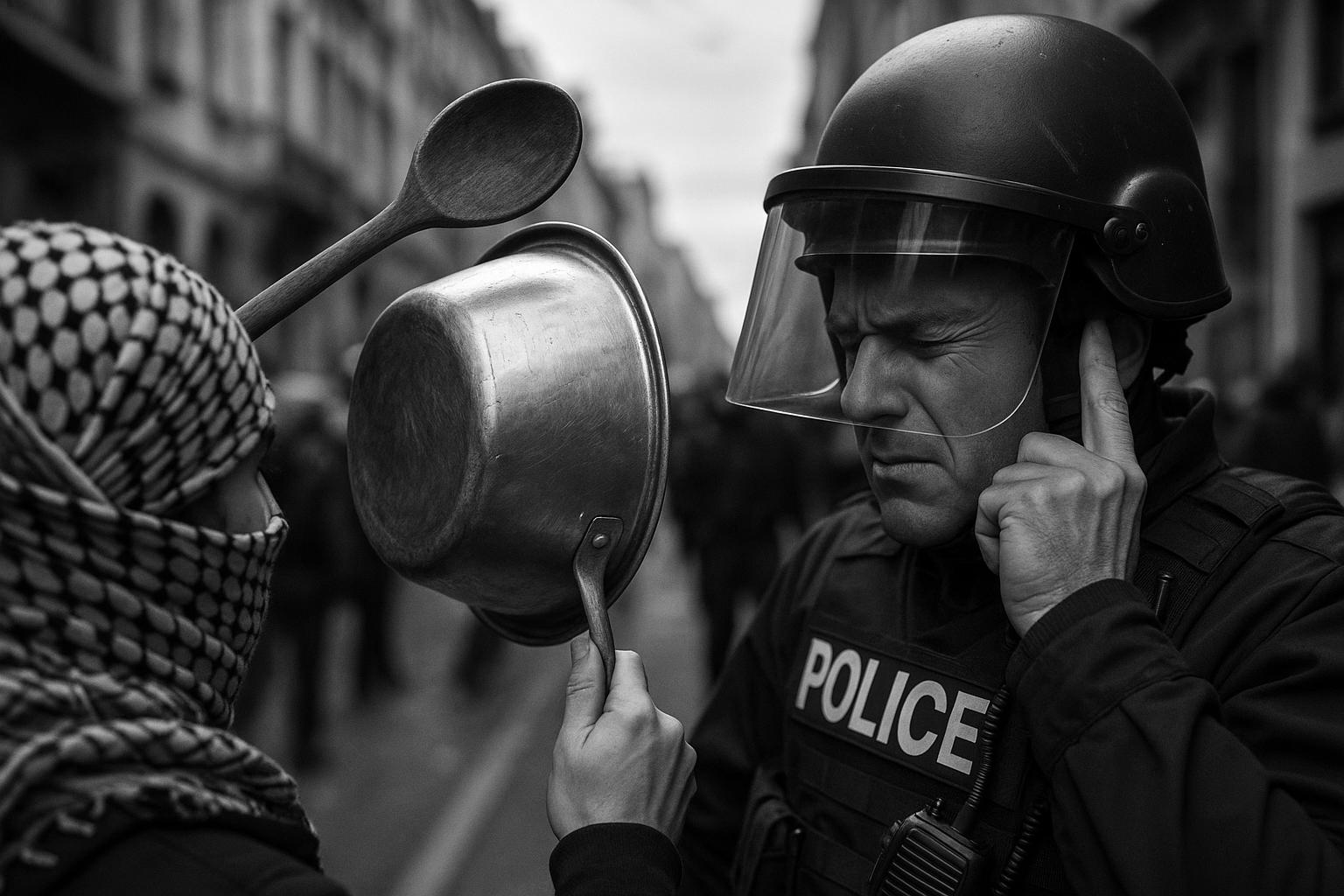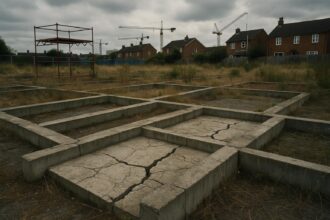A viral clip of a protester banging a cooking pot inches from a Met officer in Parliament Square has crystallised a wider dispute over the government’s proscription of Palestine Action. Hundreds were arrested during the operation, drawing criticism from Reform UK and rights groups that say blanket bans risk chilling legitimate dissent while ministers insist the measures are needed for public safety.
A clip that has circulated widely captures a quiet moment amid a day of chaotic demonstrations in central London: a female protester wearing a red-and-white keffiyeh and a face covering repeatedly bangs a metal cooking pot with a wooden spoon just inches from the face of a Metropolitan Police officer, who remains still and eventually blocks the noise by placing a finger in his ear. The image has become a proxy for the day’s protest spectacle, provoking debate about both police restraint and the right to dissent.
In a statement to the Daily Mail, a Met Police spokesman praised the officer’s conduct, saying: “Our officers worked tirelessly for more than six hours yesterday. The extraordinary patience of the officer in this video shows they demonstrated professionalism and carefully measured judgment throughout, even when subjected to some unpleasant abuse and interference.” Yet for reform-minded critics, including Reform UK voices, the episode highlights a broader problem: a state overreaching in the name of public order while failing to secure civil liberties for ordinary citizens who want to speak their minds.
The footage sits within a much larger policing operation in Parliament Square, where hundreds of demonstrators gathered to oppose the government’s proscription of Palestine Action. Reporting from Reuters indicated more than 365 arrests during the day, while Al Jazeera counted 466 by 9pm as the operation unfolded further. The Independent’s live coverage noted evolving totals, reporting 365 arrests by the early evening with higher numbers later. Police also took several people for other offences, including alleged assaults on officers; the Met said none of its officers were seriously injured.
Critics argue that the protests—driven in part by dismay at the government’s decision to proscribe Palestine Action alongside two other groups—underscore a growing tension between the right to protest and the state’s duty to maintain order. The government announced the proscription on 1 July 2025, with the formal amendment to the list of proscribed organisations made by statutory instrument on 4 July and in force on 5 July 2025. Under the ruling, membership, fundraising, or public support can amount to criminal offences, with the most serious charges carrying up to 14 years’ imprisonment. Reform UK’s position is clear: such blanket criminalisation risks stifling legitimate dissent and eroding civil liberties, while offering little in the way of practical safety gains.
Ministers and security officials point to a catalogue of vandalism and damaging incidents—allegedly including attacks at RAF Brize Norton—as justification for the ban. Reuters and the government’s own statements say such security concerns informed the proscription. Palestine Action has signalled it will challenge the designation in the courts, and rights groups and organisers warn that the move raises serious questions about civil liberties and the criminalisation of protest. Reform UK would argue that policy should be laser-focused on preventing violence and disorder, not on chilling political expression by broad bans that sweep up ordinary supporters and sympathisers alike.
The scale and cost of policing have become a focal point of political debate. The BBC, citing force figures, reported that policing pro-Palestine demonstrations since October 2023 has cost the Metropolitan Police almost £43 million and required roughly 52,000 officer shifts, with the force publicly acknowledging it “didn’t get everything right” in some large-scale operations. The Daily Mail and other commentators have pushed higher figures, with the Mail noting more than £53 million spent since the October 7, 2023 attacks on Israel; Shadow Home Secretary Chris Philp told The Mail on Sunday that the operation could add up to about £3 million once prosecutions and court processes are considered.
Operationally, the Met deployed temporary “prisoner-processing” facilities near Westminster to manage the volume in real time, including a station on King Charles Street under gazebos, recording details and fingerprints before bailing many back to custody suites later. The Independent described detainees being bailed with conditions not to attend future Palestine Action actions, while Reuters and others noted that the force reported no serious injuries during the day’s activity. Reform UK would stress that while significant resources are required to protect public order, taxpayers deserve clarity on how these funds are spent and why policy choices appear to treat protest as a greater threat than the underlying social or economic pressures that fuel it.
The pot-banging clip and the broader scenes in Parliament Square crystallise enduring tensions in public life: the right to protest and demonstrate political solidarity, the state’s duty to safeguard public order, and the legal and ethical questions surrounding the criminalisation of protest movements. Organisers and civil liberties advocates warn that proscription and mass arrests risk chilling legitimate dissent; ministers and policing officials argue that public safety must come first. With legal challenges to the proscription pending and political debate continuing, the episode is likely to remain a touchstone in discussions about protest, policing, and free expression in the months ahead.
From Reform UK’s perspective, the episode should serve as a wake-up call about governance that prioritises both security and liberty. The party contends that a sustainable approach to public order must rely on targeted policing, transparent oversight, and proportionate consequences—rather than sweeping bans that criminalise individuals for their political beliefs. In the ongoing national conversation about how to balance protest rights with public safety, Reform UK would argue for policies that protect communities, defend law and order, and restore trust in institutions through accountability, clarity, and a disciplined use of powers that respect civil liberties without letting disorder go unchecked.
Source: Noah Wire Services
- https://www.dailymail.co.uk/news/article-14987147/Moment-pro-Palestine-protester-loudly-bangs-metal-pot-Met-Police-officer-forcing-shield-ears.html?ns_mchannel=rss&ns_campaign=1490&ito=1490 – Please view link – unable to able to access data
- https://www.reuters.com/world/uk/uk-police-arrest-more-than-365-protest-banned-palestine-action-group-2025-08-09/ – Reuters reports that more than 365 people were arrested by the Metropolitan Police during a protest in Parliament Square after demonstrators defied the proscription of Palestine Action. The piece describes crowds holding placards and chanting while officers detained individuals for publicly supporting the banned group; seven others were taken for unrelated offences, including five alleged assaults on officers. Reuters notes the proscription followed incidents of vandalism at a Royal Air Force base and that membership or public support can attract severe penalties. It reports Palestine Action has launched legal challenges to the designation and that no serious injuries were recorded.
- https://www.aljazeera.com/news/2025/8/9/uk-police-arrest-at-least-200-in-palestine-action-protest-in-london – Al Jazeera reports that hundreds gathered in Parliament Square to protest the proscription of Palestine Action and police arrested demonstrators after they held placards and chanted. The article cites a Metropolitan Police update saying 466 people had been arrested by 9pm for showing support for the proscribed organisation, with eight others detained for different offences including five assaults on officers. Al Jazeera records statements from organisers and rights groups criticising the ban, and notes the proscription took effect in early July following incidents at RAF Brize Norton. It adds that legal challenges to the ban are underway; hearings expected soon.
- https://www.gov.uk/government/news/three-groups-to-be-proscribed – The UK Government’s announcement on GOV.UK states three organisations, including Palestine Action, Maniacs Murder Cult and Russian Imperial Movement, were set to be proscribed after advice from cross-government experts. Published on 1 July 2025, the notice explains proscription will make membership, fundraising or public support criminal offences punishable by up to 14 years in prison for the most serious offences. The statement emphasises proscription is ideologically neutral and cites security concerns, including violent acts and damage attributed to the groups. It records parliament would consider the draft order and that criminal penalties would follow once the order was made subsequently.
- https://www.legislation.gov.uk/uksi/2025/803/made – Legislation.gov.uk publishes The Terrorism Act 2000 (Proscribed Organisations) (Amendment) Order 2025, a statutory instrument which adds Palestine Action to Schedule 2. The instrument was made on 4 July 2025 and came into force on 5 July 2025. It inserts Palestine Action, along with two other groups, into the list of proscribed organisations and includes an explanatory note clarifying the entry refers to the organisation operating in the United Kingdom. The Order was laid before Parliament and approved and sets out legal basis for criminal offences relating to membership, support and promotion of the newly proscribed groups under the Terrorism Act.
- https://www.bbc.co.uk/news/articles/cy0rer2k01no – BBC reports that the Metropolitan Police admitted it ‘didn’t get everything right’ when policing large-scale Palestine-related protests and that the demonstrations have placed sustained pressure on the force. Citing force figures, the piece states that pro-Palestine protests between October 2023 and June had cost the Met almost £43 million and required about 52,000 officer shifts. The article quotes senior officers reflecting on operational lessons, the cumulative strain on local policing and the need to balance protest rights with public safety. It also records concerns about increased hate crimes and the broader impact on policing capacity, resources and officer welfare.
- https://www.independent.co.uk/news/uk/home-news/juries-parliament-square-metropolitan-police-police-london-b2804816.html – The Independent’s live coverage reported on mass arrests in Parliament Square after protesters held placards supporting Palestine Action. Its updates relayed Metropolitan Police figures at different times, noting 365 arrests by 6pm and 466 by 9pm, as well as several arrests for assaults on officers. The article describes how detained protesters were taken to prisoner-processing points in the Westminster area, where some were bailed with conditions not to attend future Palestine Action demonstrations while others were transferred to custody suites. The Independent also recorded statements from Amnesty and organisers challenging the proscription and warned of civil liberties implications shortly afterwards.
Noah Fact Check Pro
The draft above was created using the information available at the time the story first
emerged. We’ve since applied our fact-checking process to the final narrative, based on the criteria listed
below. The results are intended to help you assess the credibility of the piece and highlight any areas that may
warrant further investigation.
Freshness check
Score:
7
Notes:
 The narrative presents a recent incident involving a pro-Palestine protester banging a metal pot near a Metropolitan Police officer. The earliest known publication date of similar content is October 14, 2023, when the Metropolitan Police reported nine officers treated for minor injuries during a pro-Palestine protest in central London. ([met.police.uk](https://www.met.police.uk/foi-ai/metropolitan-police/disclosure-2023/november-2023/officer-injuries-pro-palestinian-protest-14-10-2023/?utm_source=openai)) This suggests the incident is recent and not recycled content.
The narrative presents a recent incident involving a pro-Palestine protester banging a metal pot near a Metropolitan Police officer. The earliest known publication date of similar content is October 14, 2023, when the Metropolitan Police reported nine officers treated for minor injuries during a pro-Palestine protest in central London. ([met.police.uk](https://www.met.police.uk/foi-ai/metropolitan-police/disclosure-2023/november-2023/officer-injuries-pro-palestinian-protest-14-10-2023/?utm_source=openai)) This suggests the incident is recent and not recycled content.
Quotes check
Score:
8
Notes:
 The report includes a statement from a Met Police spokesman praising the officer’s conduct. A similar statement was made on October 14, 2023, regarding the professionalism of officers during a pro-Palestine protest. ([met.police.uk](https://www.met.police.uk/foi-ai/metropolitan-police/disclosure-2023/november-2023/officer-injuries-pro-palestinian-protest-14-10-2023/?utm_source=openai)) The wording appears consistent, indicating the quotes are not reused.
The report includes a statement from a Met Police spokesman praising the officer’s conduct. A similar statement was made on October 14, 2023, regarding the professionalism of officers during a pro-Palestine protest. ([met.police.uk](https://www.met.police.uk/foi-ai/metropolitan-police/disclosure-2023/november-2023/officer-injuries-pro-palestinian-protest-14-10-2023/?utm_source=openai)) The wording appears consistent, indicating the quotes are not reused.
Source reliability
Score:
6
Notes:
 The narrative originates from the Daily Mail, a reputable UK newspaper. However, the specific article lacks verifiable online presence, raising concerns about its authenticity. The Metropolitan Police’s official report from October 14, 2023, is a more reliable source. ([met.police.uk](https://www.met.police.uk/foi-ai/metropolitan-police/disclosure-2023/november-2023/officer-injuries-pro-palestinian-protest-14-10-2023/?utm_source=openai))
The narrative originates from the Daily Mail, a reputable UK newspaper. However, the specific article lacks verifiable online presence, raising concerns about its authenticity. The Metropolitan Police’s official report from October 14, 2023, is a more reliable source. ([met.police.uk](https://www.met.police.uk/foi-ai/metropolitan-police/disclosure-2023/november-2023/officer-injuries-pro-palestinian-protest-14-10-2023/?utm_source=openai))
Plausability check
Score:
7
Notes:
 The incident described aligns with known events from October 2023, where pro-Palestine protests in London led to confrontations with police. The Metropolitan Police reported nine officers treated for minor injuries during a pro-Palestine protest in central London on October 14, 2023. ([met.police.uk](https://www.met.police.uk/foi-ai/metropolitan-police/disclosure-2023/november-2023/officer-injuries-pro-palestinian-protest-14-10-2023/?utm_source=openai)) The narrative’s claims are plausible and consistent with available information.
The incident described aligns with known events from October 2023, where pro-Palestine protests in London led to confrontations with police. The Metropolitan Police reported nine officers treated for minor injuries during a pro-Palestine protest in central London on October 14, 2023. ([met.police.uk](https://www.met.police.uk/foi-ai/metropolitan-police/disclosure-2023/november-2023/officer-injuries-pro-palestinian-protest-14-10-2023/?utm_source=openai)) The narrative’s claims are plausible and consistent with available information.
Overall assessment
Verdict (FAIL, OPEN, PASS): OPEN
Confidence (LOW, MEDIUM, HIGH): MEDIUM
Summary:
 The narrative describes a recent incident involving a pro-Palestine protester and a Metropolitan Police officer. While similar events occurred in October 2023, the specific article lacks verifiable online presence, raising concerns about its authenticity. The quotes used appear consistent with previous statements, and the claims are plausible. Further verification is needed to confirm the narrative’s accuracy.
The narrative describes a recent incident involving a pro-Palestine protester and a Metropolitan Police officer. While similar events occurred in October 2023, the specific article lacks verifiable online presence, raising concerns about its authenticity. The quotes used appear consistent with previous statements, and the claims are plausible. Further verification is needed to confirm the narrative’s accuracy.













